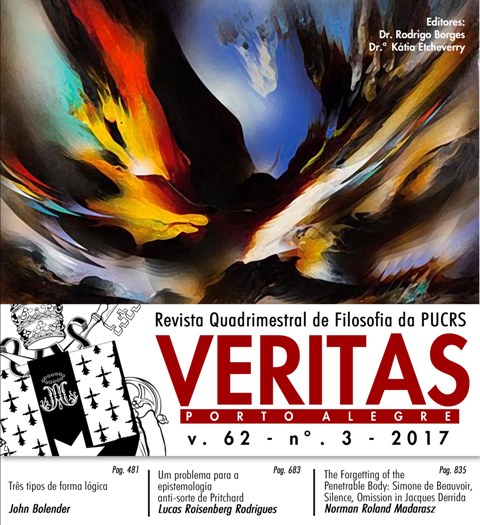Um problema para a epistemologia anti-sorte de Pritchard
DOI:
https://doi.org/10.15448/1984-6746.2017.3.28460Keywords:
análise do conhecimento, sorte epistêmica, sorte, segurança.Abstract
Este artigo propõe uma crítica à epistemologia anti-sorte, tal como defendida por Duncan Pritchard. A teoria de Pritchard é uma das mais bem desenvolvidas explorações do conceito de sorte, e da sua significação epistêmica. Ele julga possível derivar uma condição que exclua a sorte epistêmica a partir de uma análise modal do conceito de sorte. A cláusula epistêmica resultante é uma condição denominada princípio de segurança. Após apresentar a teoria e algumas de suas motivações, argumento que ela não consegue responder a uma objeção apresentada por Mark McEvoy, e que consiste em uma variação do exemplo da loteria. Por fim, alego que o princípio de segurança, tal como defendido por Pritchard, não captura corretamente nossas intuições sobre quando sorte está ausente ou presente.
Downloads
References
DANCY, J.. An introduction to contemporary epistemology. Oxford: Blackwell,1985.
HETHERINGTON, S. Good knowledge, bad knowledge: On two dogmas of epistemology. Boulder: Clarendon Press, 2001. DOI: https://doi.org/10.1093/acprof:oso/9780199247349.001.0001
HETHERINGTON, S. “Actually knowing”. The Philosophical Quarterly, 48, 193 (1998), p. 453-469. DOI: https://doi.org/10.1111/1467-9213.00114
LEWIS, D.. Counterfactuals. Oxford: Blackwell Publishing, 1973.
MCEVOY, Mark. “The Lottery Puzzle and Pritchard’s safety Analysis of Knowledge”. Journal of Philosophical Research, 34 (2009), p. 7–20. DOI: https://doi.org/10.5840/jpr_2009_3
PRITCHARD, D. Epistemic luck. New York, USA: Oxford University Press, 2005. DOI: https://doi.org/10.1093/019928038X.001.0001
________. Knowledge, luck, and lotteries. In: HENDRICKS, V.;
PRITCHARD, D. (org.). New Waves in epistemology. NY: Palgrave Macmillan, 2008, p. 28-51.
________. “Safety-Based Epistemology: whiter now?”. Journal of Philosophical Research, 34 (2009), p. 33-45. DOI: https://doi.org/10.5840/jpr_2009_2
________. “Anti-luck virtue epistemology”. The Journal of Philosophy, 109, 3, (2012a), p. 247-279. DOI: https://doi.org/10.5840/jphil201210939
________. In defense of modest anti-luck epistemology. In: BECKER, K.; BLACK, T.. (Org.). The Sensitivity Principle in Epistemology. Cambridge, UK: Cambridge University Press, 2012b, p. 173-192. DOI: https://doi.org/10.1017/CBO9780511783630.014
RODRIGUES, L.. As epistemologias modais e seus críticos. 2017. 123f. Tese (Doutorado em filosofia) – Instituto de Humanidades, Pontifícia Universidade Católica do Rio Grande Do Sul (PUCRS), Porto Alegre, 2017
RUSSELL, B. The problems of philosophy. Oxford, UK: Oxford University Press, 2001.
________. Human knowledge: Its scope and its limits. New York: Simon & Schuster, 1948.
SHOPE, R. The Analysis of Knowing: A Decade of Research. Princeton, New Jersey: Princeton University Press, 1983.
SOSA, E. “How must knowledge be modally related to what is known?”. Philosophical Topics, 26, 1(1999a), p. 373–384. DOI: https://doi.org/10.5840/philtopics1999261/229
________. “How to defeat opposition to Moore”. Philosophical perspectives, 13(1999b), p. 141- 153. DOI: https://doi.org/10.1111/0029-4624.33.s13.7
STALNAKER, R. A Theory of Conditionals. In: Rescher, N (ed.). Studies in Logical Theory. Oxford, UK: Oxford University Press, 1981, p. 98-112.
UNGER, P. “An analysis of factual knowledge”. The Journal of Philosophy, 65, 6 (1968), p. 157-170. DOI: https://doi.org/10.2307/2024203
WILLIAMSON, T. Knowledge and Its Limits. Oxford, UK: Oxford University Press, 2000.
Downloads
Published
How to Cite
Issue
Section
License
Copyright
The submission of originals to Revista Veritas implies the transfer by the authors of the right for publication. Authors retain copyright and grant the journal right of first publication. If the authors wish to include the same data into another publication, they must cite Revista Veritas as the site of original publication.
Creative Commons License
Except where otherwise specified, material published in this journal is licensed under a Creative Commons Attribution 4.0 International license, which allows unrestricted use, distribution and reproduction in any medium, provided the original publication is correctly cited. Copyright: © 2006-2020 EDIPUCRS</p






